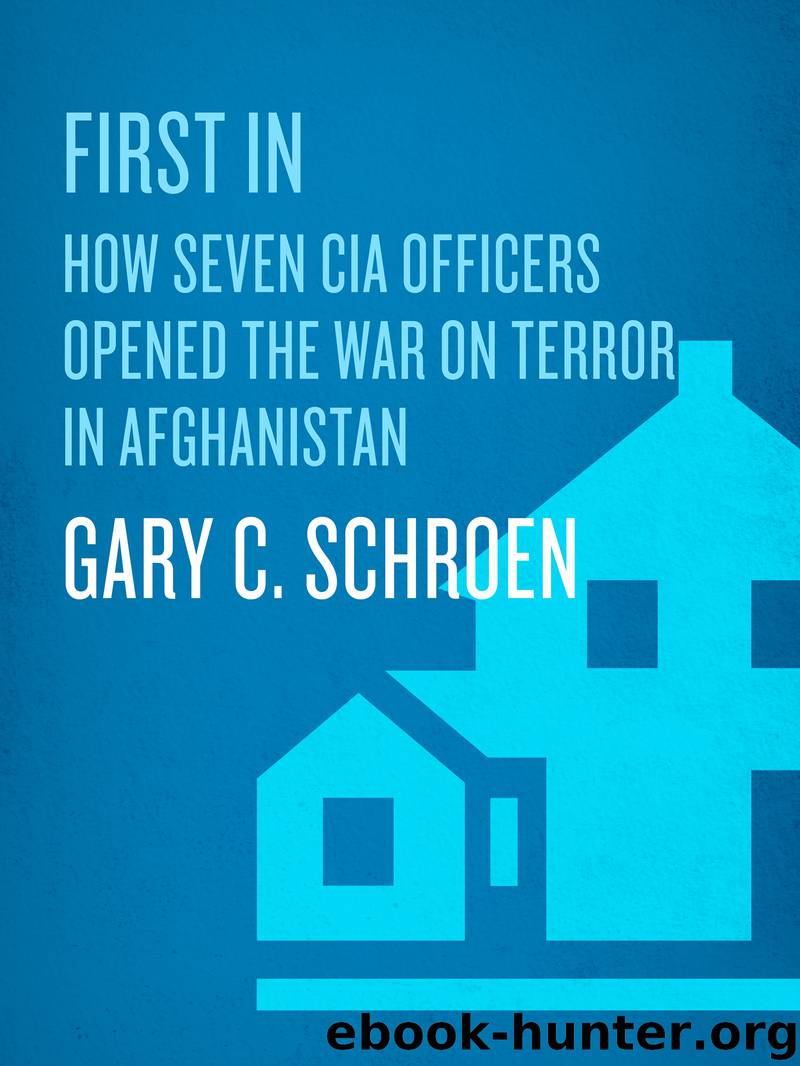First In by Gary Schroen

Author:Gary Schroen
Language: eng
Format: epub
ISBN: 9780345484598
Publisher: Random House Publishing Group
Published: 2005-05-09T16:00:00+00:00
Our meeting with Dr. Abdullah took place at 5:00 p.m. Abdullah had a personal “villa” a few miles south of Astaneh, on a small one-lane road that climbed toward the hills, affording him a good view of the river and the hills on the east side of the valley. As I expected, Dr. Abdullah was alone, and he greeted us warmly. He was dressed in his usual casual Western-style clothing, and after the mandatory tea was served, he relaxed on his comfortable sofa and welcomed us.
He was happy with our cooperation and said he appreciated the money that we had so far provided. It was true that the bombing around Kabul was not what the NA leadership hoped for, but he recognized that political pressures were affecting how the bombing was being conducted. His candor opened the door for a frank discussion on my part about the political situation we faced back in Washington. I said there were fears that a Tajik victory in Kabul would lead to a bloodbath of revenge killings against Pashtuns who had supported the Taliban. There was also concern that taking Kabul might embolden the Northern Alliance to push farther south and east, moving into traditional Pashtun areas, to gain a strategic advantage in post-Taliban political negotiations over how power would be shared.
Dr. Abdullah said he was well aware of those concerns but felt they had no merit. He reminded me that the Tajik forces of Ahmad Shah Masood were welcomed in Kabul in 1992, and mentioned how those forces had behaved when they occupied the city. There were no executions, arrests, or persecution of those who had served the Soviets or the Najibullah regime. Abdullah felt that this was all Pakistani and Pashtun propaganda aimed at creating a climate wherein the Tajik and other ethnic minorities of the north would be isolated and ignored, allowing a conservative Pashtun government—under strong Pakistani influence—to come to power.
Dr. Abdullah was also aware that Abdul Haq, a senior Pashtun commander from the Jihad days, was in direct contact with senior policy-makers in Washington and was being supported by several wealthy Afghan-American businessmen with strong connections to senior members of the U.S. policy-making community. In addition to his strong political ambitions, Abdul Haq had always opposed Masood and the Tajiks. His popularity with key officials at the State Department and within the NSC was troubling, because he would certainly be pressing the same negative line about holding the Tajiks back from Kabul and focusing on the Pashtun south.
Abdullah was convinced that if he could visit Washington to meet with senior policy-makers, he would be able to clearly articulate the political policies of the Northern Alliance and, he hoped, reduce the distrust and fears of those who did not understand Afghanistan and its tortured history of these last twenty-plus years. I agreed that his visit to Washington was important.
Dr. Abdullah did suggest, however, that Wali Masood, one of Ahmad Shah Masood’s younger brothers, and a member of the NA inner leadership circle, accompany him on this visit.
Download
This site does not store any files on its server. We only index and link to content provided by other sites. Please contact the content providers to delete copyright contents if any and email us, we'll remove relevant links or contents immediately.
| Afghan & Iraq Wars | American Civil War |
| American Revolution | Vietnam War |
| World War I | World War II |
Waking Up in Heaven: A True Story of Brokenness, Heaven, and Life Again by McVea Crystal & Tresniowski Alex(37004)
Empire of the Sikhs by Patwant Singh(22173)
We're Going to Need More Wine by Gabrielle Union(18074)
Hans Sturm: A Soldier's Odyssey on the Eastern Front by Gordon Williamson(16632)
Leonardo da Vinci by Walter Isaacson(11903)
The Radium Girls by Kate Moore(10907)
Educated by Tara Westover(7063)
Tools of Titans by Timothy Ferriss(6947)
How to Be a Bawse: A Guide to Conquering Life by Lilly Singh(6693)
The Last Black Unicorn by Tiffany Haddish(5075)
Permanent Record by Edward Snowden(4998)
The Rise and Fall of Senator Joe McCarthy by James Cross Giblin(4843)
Promise Me, Dad by Joe Biden(4447)
The Wind in My Hair by Masih Alinejad(4424)
The Crown by Robert Lacey(4105)
A Higher Loyalty: Truth, Lies, and Leadership by James Comey(4033)
The Iron Duke by The Iron Duke(3639)
Joan of Arc by Mary Gordon(3258)
How to be Champion: My Autobiography by Sarah Millican(3186)
